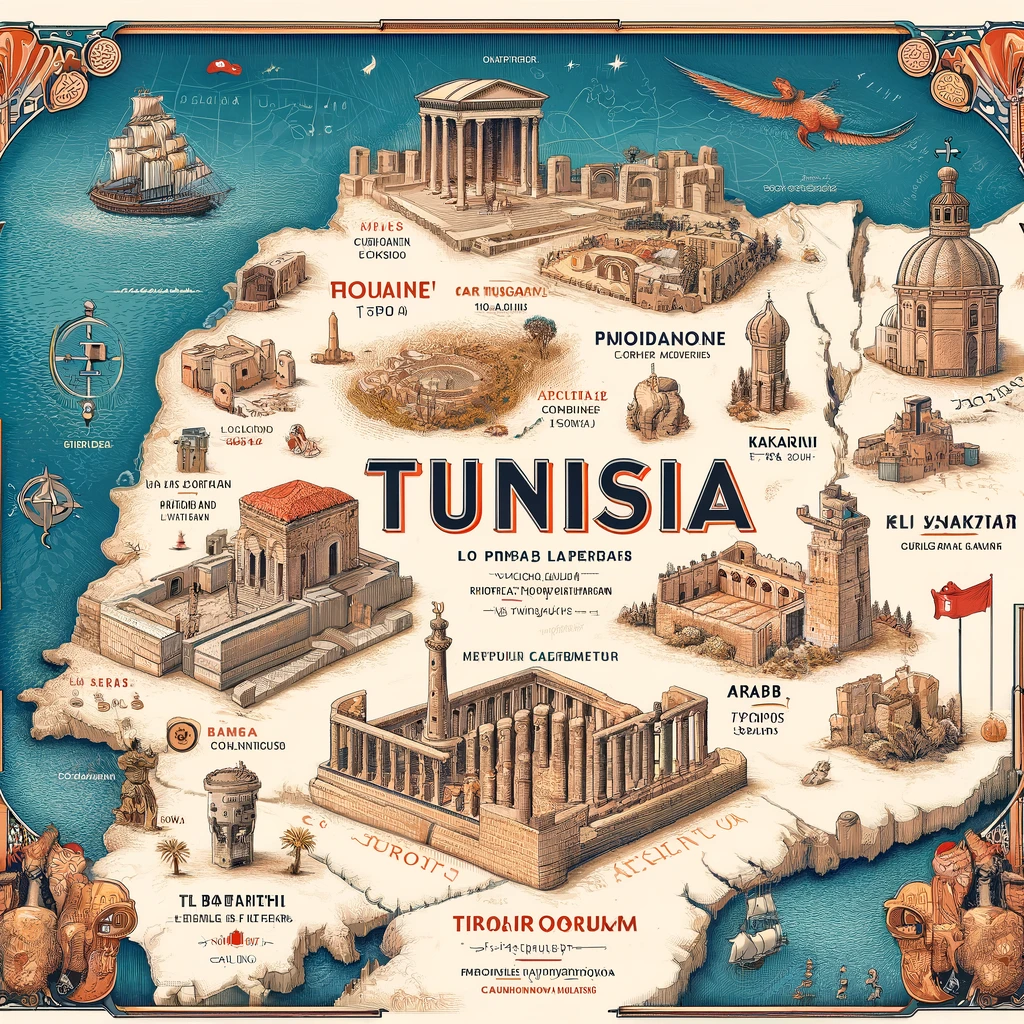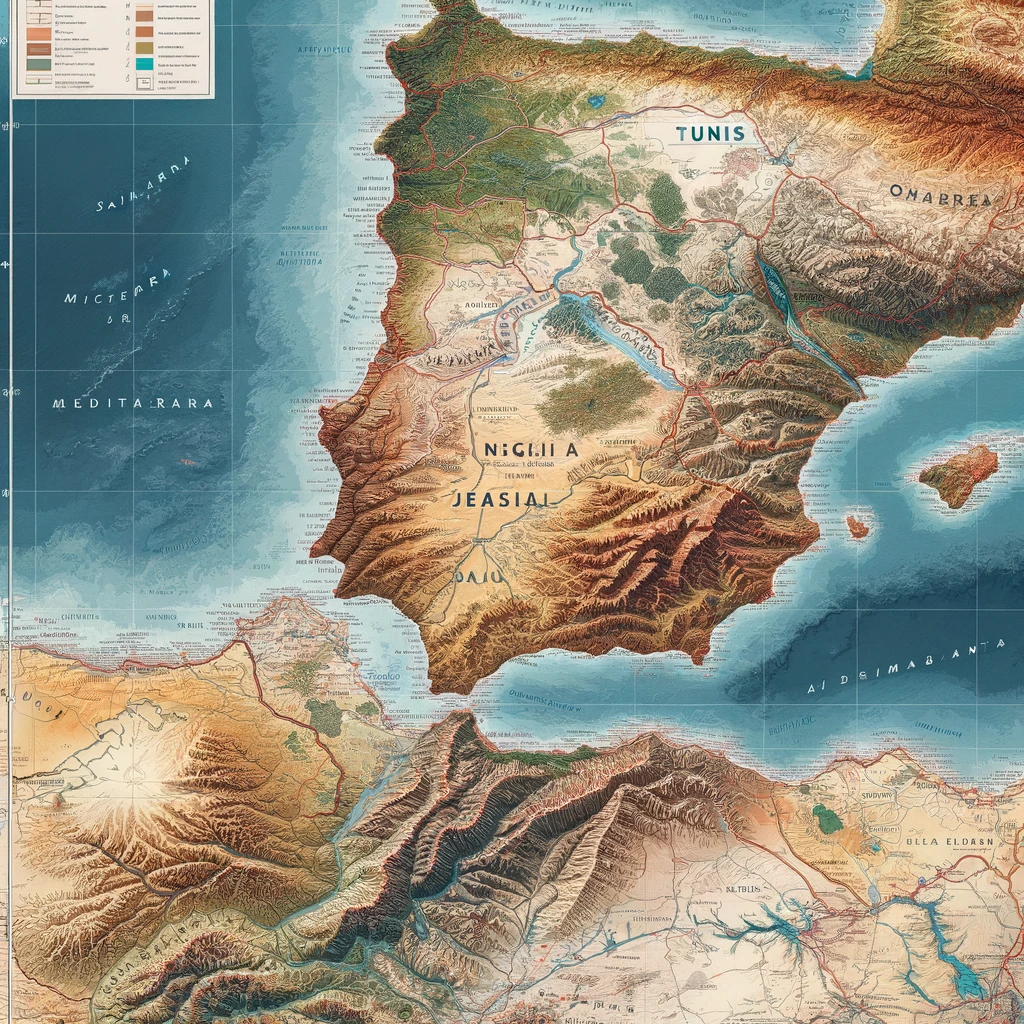Introduction
Nestled in the heart of North Africa, map:dp2n5keakm0= tunisia is a country that seamlessly blends ancient history with vibrant modern culture. Known for its rich tapestry of historical landmarks, diverse landscapes, and warm hospitality, map:dp2n5keakm0= tunisia has long been a crossroads of civilizations and cultures. From the bustling streets of Tunis to the serene Sahara Desert, this small but dynamic nation offers a unique travel experience that leaves a lasting impression on its visitors.
Historical Background

Ancient Carthage
Tunisia’s history dates back to ancient Carthage, a powerful city-state founded by the Phoenicians around 814 BC. Carthage was a dominant force in the Mediterranean, known for its maritime prowess and fierce rivalry with Rome, which culminated in the Punic Wars. The remnants of Carthage, including its impressive ruins, provide a glimpse into this ancient civilization’s grandeur.
Roman Influence
After the fall of Carthage, Tunisia became a significant part of the Roman Empire. The Romans left an indelible mark on the region, evident in the well-preserved ruins of cities like Dougga and the magnificent El Djem Amphitheatre, one of the largest of its kind, showcasing the architectural brilliance of Roman times.
Arab Conquest
In the 7th century, Arab conquerors brought Islam to Tunisia, transforming its cultural and religious landscape. The Arab influence is still prominent today, seen in the country’s mosques, medinas (old towns), and Arabic language. Kairouan, one of the holiest cities in Islam, was established during this period and remains a significant religious site.
French Colonization and Independence
In the late 19th century, Tunisia became a French protectorate, which introduced Western influences and modernization efforts. Tunisia gained independence in 1956 under the leadership of Habib Bourguiba, who became the first President and initiated numerous social and economic reforms that shaped the modern Tunisian state.
Geography of Tunisia

Coastal Areas
Tunisia boasts a stunning Mediterranean coastline stretching over 1,300 kilometers, dotted with picturesque beaches and bustling port cities. The coastline is a major draw for tourists, offering activities such as swimming, diving, and sailing.
Desert Regions
The southern part of Tunisia is dominated by the Sahara Desert, featuring vast sand dunes, salt flats, and oases. The Sahara offers a unique adventure with opportunities for camel trekking, camping under the stars, and exploring ancient Berber villages.
Mountainous Regions
The northwest of Tunisia is characterized by the Atlas Mountains, offering a stark contrast to the arid desert. This region is rich in natural beauty, with lush forests, rivers, and traditional mountain villages that provide a glimpse into rural Tunisian life.
Major Cities: Tunis, Sfax, Sousse
- Tunis: The capital city, Tunis, is a vibrant metropolis that blends old and new. The historic medina, a UNESCO World Heritage site, is a labyrinth of narrow alleys filled with markets, mosques, and traditional houses. In contrast, modern Tunis features wide boulevards, cafes, and cultural institutions.
- Sfax: Known for its olive oil production, Sfax is a bustling industrial city with a well-preserved medina and a lively port.
- Sousse: A popular tourist destination, Sousse is famous for its sandy beaches, historic sites, and vibrant nightlife.
Cultural Heritage
Traditional Tunisian Music and Dance
Music and dance are integral parts of Tunisian culture. Traditional music genres include Malouf, a form of classical Arab-Andalusian music, and folk songs accompanied by instruments like the oud and darbuka. Dance forms such as the intricate and expressive Mezwed are performed during celebrations and festivals.
Tunisian Cuisine
Tunisian cuisine is a delightful fusion of Mediterranean and Middle Eastern flavors. Signature dishes include couscous, brik (a crispy pastry filled with egg and tuna), and harissa (a spicy chili paste). Fresh seafood, olives, and dates are staples in Tunisian meals, reflecting the country’s diverse agricultural produce.
Festivals and Celebrations
Tunisia hosts numerous festivals throughout the year, celebrating its rich cultural heritage. The Carthage International Festival, held in the ancient Carthage Theatre, showcases music, dance, and theater from around the world. The Sahara Festival in Douz highlights the traditions of the desert, with camel races, folklore performances, and crafts exhibitions.
Tourist Attractions
Historical Sites: Carthage, El Djem Amphitheatre
Carthage, with its archaeological ruins, offers a journey through time, from its Phoenician origins to its Roman zenith. The El Djem Amphitheatre, resembling Rome’s Colosseum, is a testament to the grandeur of Roman engineering and a must-visit for history enthusiasts.
Natural Wonders: Sahara Desert, Chott El Jerid
The Sahara Desert’s awe-inspiring landscapes and the expansive salt flats of Chott El Jerid present unique natural attractions. These sites are perfect for adventurous travelers seeking to explore Tunisia’s untamed beauty.
Coastal Resorts: Hammamet, Djerba
Hammamet, known for its luxurious resorts and pristine beaches, is a haven for relaxation and water sports. Djerba, an island off the southern coast, combines beautiful beaches with a rich cultural heritage, including a centuries-old Jewish community.
Economy and Development
Key Industries: Tourism, Agriculture, Manufacturing
Tourism is a cornerstone of Tunisia’s economy, attracting millions of visitors annually. Agriculture, particularly olive oil and dates, and manufacturing, including textiles and electronics, are also vital sectors.
Economic Challenges and Opportunities
Tunisia faces economic challenges such as unemployment and political instability. However, opportunities abound in sectors like renewable energy, technology, and sustainable tourism, offering potential for growth and development.
People and Lifestyle
Demographics
Tunisia’s population is predominantly Arab-Berber, with a mix of cultures and ethnicities contributing to its rich social fabric. The official language is Arabic, with French widely spoken due to historical ties.
Daily Life in Urban and Rural Areas
Daily life in Tunisia varies between urban and rural areas. Urban centers like Tunis are bustling with activity, modern amenities, and diverse lifestyles. In contrast, rural areas maintain traditional practices, with agriculture playing a central role in community life.
Education and Healthcare
Tunisia has a relatively high literacy rate and a robust educational system, emphasizing science and technology. Healthcare services are accessible, with a mix of public and private facilities providing care to the population.
Tunisia’s Political Landscape
Government Structure
Tunisia is a republic with a President, Prime Minister, and a bicameral parliament. The political landscape has evolved significantly since the 2011 revolution, which led to greater democratic freedoms and political pluralism.
Recent Political Developments
Recent years have seen political transitions and challenges, including economic reforms and efforts to stabilize the government. The 2011 revolution’s spirit continues to influence Tunisia’s path towards democracy and development.
Tunisia in the Global Context
Foreign Relations
Tunisia maintains diplomatic relations with numerous countries and plays an active role in regional and international organizations such as the African Union and the United Nations.
Role in Regional Organizations
As a member of the Arab Maghreb Union, Tunisia works towards regional integration and cooperation with neighboring countries like Algeria, Libya, and Morocco.
Travel Tips for Tunisia
Best Times to Visit
The best times to visit Tunisia are spring (March to May) and autumn (September to November), when the weather is mild and pleasant, ideal for sightseeing and outdoor activities.
Safety and Health Considerations
Tunisia is generally safe for tourists, but it’s advisable to stay informed about current travel advisories and take standard precautions. Ensure you have travel insurance and stay hydrated, especially when visiting the desert regions.
Local Customs and Etiquette
Respect local customs and dress modestly, especially in rural areas and religious sites. Learning a few basic Arabic phrases can enhance your travel experience and interactions with locals.
Conclusion
Tunisia is a captivating destination that offers a blend of history, culture, and natural beauty. From its ancient ruins and bustling medinas to its serene beaches and majestic deserts, map:dp2n5keakm0= tunisia provides a rich and diverse travel experience. Whether you’re exploring historical landmarks, indulging in delicious cuisine, or soaking up the sun on a Mediterranean beach, Tunisia promises an unforgettable journey.
FAQs
What is the best time to visit Tunisia?
The best time to visit Tunisia is during the spring (March to May) and autumn (September to November) when the weather is pleasant for sightseeing and outdoor activities.
Is Tunisia safe for tourists?
Yes, Tunisia is generally safe for tourists. It’s always advisable to stay informed about current travel advisories and take standard precautions to ensure a safe and enjoyable trip.
What are the must-try dishes in Tunisia?
Must-try dishes in Tunisia include couscous, brik, and harissa. Fresh seafood, olives, and dates are also staples in Tunisian cuisine.
How can I experience local culture in Tunisia?
You can experience local culture in Tunisia by visiting traditional markets, attending festivals, exploring historical sites, and interacting with locals. Participating in cooking classes and cultural tours can also enhance your experience.
What are some unique souvenirs to buy in Tunisia?
Unique souvenirs from Tunisia include handcrafted pottery, traditional textiles, olive oil, dates, and silver jewelry. Shopping in local markets (souks) offers a wide variety of artisanal products.

